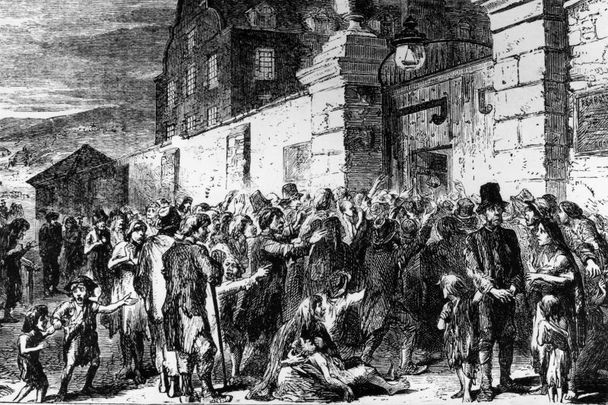A leading Catholic priest, who is also a local historian in County Mayo, has created a major controversy after he wrote that the Great Famine caused a huge breakdown in “moral values” among the starving Irish.
Father Brendan Hoban, a priest in the parish of Killala where the Famine hit hard, made the statements in an opinion piece in The Irish Times titled “Unspoken Realities: The Great Famine Eroded Moral Values.”
He wrote that the Catholic Church at the time created the false impression that the Irish bore their suffering without resorting to violence or moral degradation.
This, he wrote, was simply not true. There was, he claims, a major moral breakdown among the starving Irish.
Read more
What did he expect? Hosannas to the brutal landlords who were evicting hundreds of thousands and indifference to the fact that a million people were starving?
I had to pause a few times to really allow his words to sink in. Moral values when people are starving in their millions is about as relevant a topic as discussing snow in the Sahara.
What on earth were starving people to do? The pity is they weren’t more violent in seeking food and that the church did not lead them.
Hoban clearly thinks otherwise. He lists a long series of Irish betrayals of moral values.
He writes, “Along the Erris coastline, piracy was rampant with soldiers having a very public presence. In Belmullet, in September 1846, a crowd estimated at 500 were dissuaded by local clergy from breaking open food stores. In Ballina, the guardians of the workhouse were confronted by a group demanding that export of corn from the quay be ended.
“In Ballycastle, a public notice advertised a meeting to organize relief and threatened landowners who didn’t attend with being ‘sawed and quartered.’ In Ardagh, food carts were attacked by a large mob.
“In general, protests, food riots and lawlessness in various forms were common. Sheep were stolen. Murders were committed for a bag of meal. Courts were busy. Perpetrators were imprisoned and sometimes transported to Australia.”
In the parish of Partry, Hoban notes, a parish priest recorded a case of cannibalism.
Blaming the victims of the Famine, as this priest does, for a breakdown in moral values is like blaming Holocaust victims for what the Germans did.
Thankfully, an Irish Times reader, Brian Keenan, answered fulsomely.
“It’s hard to think of a less insightful angle than that chosen by this priest in scrutinizing the ‘morals’ of a famine-stricken people. It speaks volumes on the arrogance and presumption of the clergyman that he actually believes himself qualified to sit in judgment,” Keenan wrote.
“Morals are not an absolute value; they depend on context. It is a well-established fact that in times of famine, some of the starving consume the flesh of the dead. This is not a moral breakdown, it’s a survival mechanism. What is a moral breakdown, however, is the clergy urging the starving not to steal from the well-supplied rich.
“The moral failure was that Sir Charles Trevelyan, the British civil servant in charge of Ireland, believed that the more Irish who died, the better for the British because they could finally expand their holdings and make them even more profitable. Trevelyan’s take was ‘the judgment of God sent the calamity to teach the Irish a lesson.’”
That is the utter failure of moral values right there.

Love Irish history? Share your favorite stories with other history buffs in the IrishCentral History Facebook group.




Comments